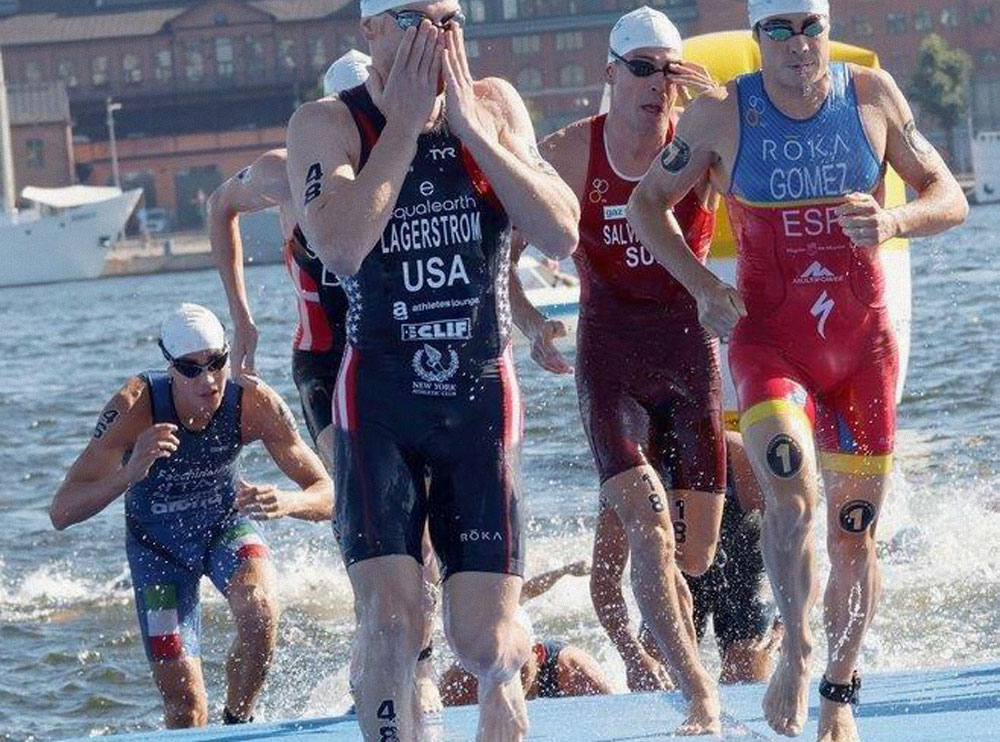Forget the boozy business lunch: It seems Londoners are more likely to strike a deal during a corporate triathlon event than over a bottle of Merlot.
With triathlon season already in full swing, Third Space physiotherapist Sophie Apps takes a look at the growing popularity of the sport and gives her top tips on how to succeed in all three disciplines with your body (and corporate reputation) intact.
Triathlon is one of the fastest growing sports in the UK, according to national governing body British Triathlon, and big name firms have taken note. Property company JLL’s swim-bike-run event for professionals has become the second-largest one-day triathlon in the UK. Rival firm Colliers launched their “Tryathlon” a few years ago as a networking event (with a little competition thrown in) and numbers have tripled year-on-year.
The draw of a sporting event, especially a triathlon, as an opportunity to meet people and make business connections, is clear: it is fun, inclusive – women are just as likely to take part as men – and it doesn’t generate a hangover. There are also many different types of triathlon to suit all levels. However, whether you have entered a Sprint for a bit of fun or you are training for an Iron Man, preparation is key. Without proper training, injuries can occur. Plus you wouldn’t want to lose face with your work colleagues. Read on for some essential dos and don’ts of triathlon training.

Swim
Most triathletes claim they are terrible swimmers, and it’s the part of the race they least enjoy. However, if you happen to have a background in swimming, this is where you set the bar for the rest of the race. Getting ahead on the swim means you exit early out of the water, giving you the lead on others. Practising in open water will give you a great advantage and help overcome nerves on race day.
Do: Train sensibly. A triathlon is undertaking three disciplines rather than just one, so be prepared for all three. Don’t think you can get to the last part of the race (the run) and still have a lot of energy.
Don’t: Wear new kit. Everything should be tried and tested, if you’re going with a Trisuit (one piece) make sure it is comfortable to swim, bike and run in. Don’t leave it until race day to find out it rubs and causes discomfort.
Bike
If you’re a good cyclist, in my opinion you’re already halfway there, as generally the cycle section is the longest part of any triathlon. This is the part of the race where adrenaline is pumping as you are overtaking and making up any lost ground on the swim to get stuck into that run. If you’re a novice, don’t be intimidated by the flash bikes and gadgets you’ll see some athletes using – in your training the focus should be building up the miles. Being comfortable on the bike is essential, so ensure you’re happy with your kit and you have enough padding in your shorts to give you comfort.
Do: Practise bric sessions; completing two different disciplines together so your body knows how it feels to go from one thing to the next, and you’re ready for it. Keep them the same order as you will when you race, either swim then bike or bike then run.
Don’t: Neglect your core muscles: one session a week of core workout will go a long way to help keep good posture on the bike and once you get onto the run part of your course.
Run
Most competitors are tired by the end of their race and find the run a tough mental challenge to take on, so if you’re a natural runner this is where you come into your element. Other athletes may have set off faster than you, but this is your chance to pick them off one by one and maintain a strong finish. Running well over an endurance event such as a triathlon is simply about getting into a good rhythm. Once you feel comfortable on the run, particularly after having “jelly legs’’ coming off the bike, you can then settle into a pattern of running at your comfortable pace that sees you through to that finish line.
Do: Hydrate and eat right on race day. You can practise this before the event during your training, so you understand what works for you – my personal secret weapon is a pork pie when on the bike section.
Don’t: Avoid that niggle. If something doesn’t feel right, get it checked out before it’s too late. Come and see us for an appointment sooner rather than later.
Sophie Apps, a competitive runner and triathlete, is part of the Third Space Medical team, based in Canary Wharf. Graduating from Kings College London in 2010, she initially worked in the NHS before moving into private practice to develop her interest in musculoskeletal and sports physiotherapy. She has a wide experience in treating back and neck disorders as well as sports and post operative rehabilitation.
Within her day to day practise she integrates sports massage, acupuncture, sports taping and pilates into her approach to rehabilitation.
To book an appointment with Sophie at Third Space, please call: : 0203 773 5157










